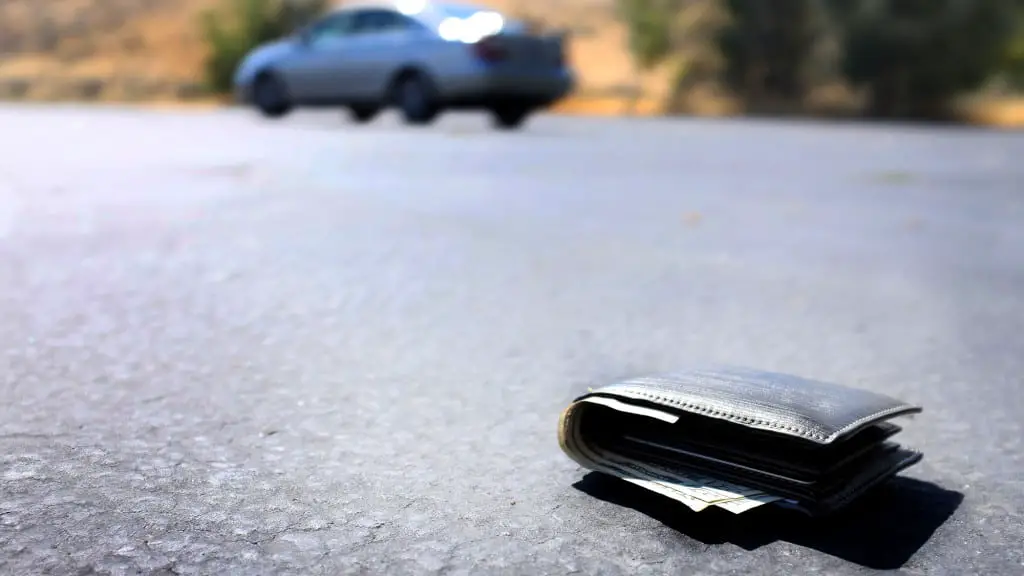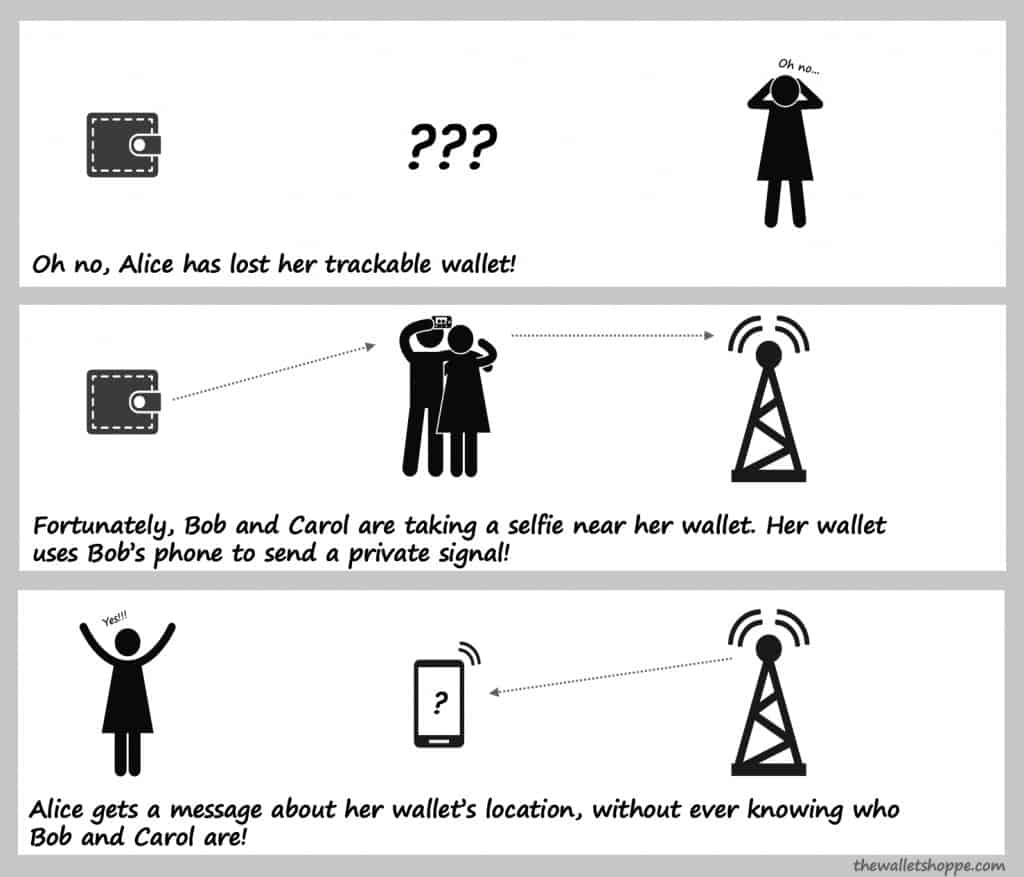Tired of losing your wallet? Want to know who makes the best wallet tracker so you can easily find it next time?
We’ll compare the Big 4 (that’s AirTag, Tile, and Ekster/Chipolo) and tell your which is our favorite and why.
Along the way we’ll cover how a trackable wallet actually works (which might surprise you).

Wallet Trackers – Quick Summary
For those that just want the quick and dirty – these are the wallet trackers we’ll be discussing:








For those that want more details, please read on!
How Does a Wallet Tracker Work?
Before we can talk about which tracker is best, let’s start by talking about how these gadgets work in the first place.
Pretty much every trackable wallet works in essentially the same way. The wallet manufacturer partners with a technology company that makes a GPS tracking device that is the right size and weight to slip into a wallet.
These are usually separate devices, not built into the wallet itself. The tracker is paired with an app on your phone that allows you to find your wallet on a map.
There is one main downside to this approach – namely that if someone steals your wallet, they can simply remove the tracker. We don’t think this is such a big deal. We suspect most thieves are likely to take the cash and credit cards and dispose of the wallet anyway, disposing of the credit cards as well as soon as they get locked down by your bank.
The upside to having a separate unit is that technology is constantly evolving. When the new versions come out with some must-have new features? You just take out the old one and replace with the newest little gadget.
We knew what bluetooth tracking was, but we had to dig a bit to understand crowd-tracking. The gist of it is this—millions of people are using these products to track their goods. They are in essence a part of a network or community that helps people find their stuff.
Bluetooth tracking works if you’re within 100 feet or so of the product. Once you leave or lose your wallet and are more than the “Bluetooth distance” away from it—the crowd-tracking kicks in.
All of these devices work with a phone app where you can see exactly where your wallet was last “seen” by the network, but if someone else who has tracker software installed on their phone walks by your device, it will securely (and privately) send you an update as to the exact location of your tracker. (The biggest network is Apple’s “Find My” network, which is installed on every new iPhone.)
The person who sent it will never even know it, they’re just doing a good deed by being a part of the network. (also – people won’t steal your stuff). We created this diagram below to illustrate:

Why Do Trackers Use a Cellphone’s GPS?
You might be wondering why wallet trackers piggy-back off other people’s phones instead of simply having their own transmitters. There are two main reasons: weight and power. A transmitter capable of using cellphone towers directly would basically be a cellphone in its own right. That would require a much bigger and heavier device, that would need more power. Most of these trackers have batteries that go for a year or more – a more powerful transmitter would drain the battery MUCH faster.
Other Features of Trackable Wallets
The features just keep on coming. Most of these trackers have an alarm or beeper of some kind. This can work in two ways:
- When you are somewhere near your wallet, you can use the app to make the tracker start beeping to help you find exactly where it is
- Many of these gadgets can make your phone start beeping a warning if you get too far away from your wallet so you don’t leave it behind, or even press a button on the tracker if you have your wallet but can’t find your phone!
You can even link these cards with voice assistants so you can ask Siri, Alexa, Google, “Where’s my wallet?”
The Main Players in Trackable Wallets
There are four main players we want to discuss here. With the exception of the Ekster, which is very much designed around their own wallet, most of them actually build a range of trackers which can be used to track everything from luggage to pets. We will focus on the trackable wallet use case of course.
Ekster Card
The Ekster Tracker Uses Solar Power To Charge Its Battery
We consider the Ekster to be the OG of the trackable wallet world (technically Tile released their tracker earlier, but not in a wallet-friendly form). We liked the wallet range so much we wrote a full Ekster wallet review.
Ekster partnered with Chipolo (see below) to build their custom, white-labeled tracker card. Designed to fit their Parliament or Senate ejector wallets, this slim, splash-resistant, solar-powered card can even be used as a bluetooth control to enable remote selfie-taking with your phone camera.
| Dimensions | 0.15 x 2 x 3.5 in (0.3 x 5 x 8.5 cm) |
| Credit Card Compatible? | Yes |
| Devices | Apple/Android |
| Lost and Found Network | Apple FindMy + Chipolo Users |
| Battery | 2 months, Solar Recharge in 3 hours |
| Range | 200 ft (60 m) |
| Water Resistant? | Yes |
Although this is designed to work seamlessly with the Ekster wallets, there is nothing stopping you putting this credit card sized tracker in any other wallet of your choice. We particularly like the solar-powered aspect. Most of the other trackers have batteries that will die eventually and most will require the whole unit to be replaced.
That might at first seem like a slam dunk – but really, we all know technology improves at a crazy pace. So when a battery-powered tracker dies, you’ll replace with a newer, probably improved tracker. So is the solar power a huge advantage? Maybe. It depends if you’re the sort of person who always wants the latest thing. If so, you may find yourself getting a new tracker anyway …
Chipolo CARD
Chipolo was launched out of a Kickstarter back in 2013. The company is headquartered in Slovenia and has received funding from TechStars amongst others. They make a variety of tracker products in addition to their partnership with Ekster, including tags that can be hooked onto clothing, luggage, etc.
Initially, Chipolo worked by creating their own network of devices. Every phone with the Chipolo app installed to track the owner’s belongings could be co-opted to help locate other tags owned by people in the community. The later Chipolo devices have been designed to take advantage of Apple’s own “Find My” network, which vastly increases the number of devices that will help you find your stuff.
The one we’re most interested in is the Chipolo Card. This comes in two flavors, one of which uses Apple’s tech, the other uses Chipolo’s network and should be your choice if you use Android. This is very similar to the Ekster (not a big surprise there) but the battery choice is different, with a single use non-replaceable battery with a one-year lifespan (they have a program you can sign up for that lets you replace the card at half price.)
All in all, a great option from a very innovative company.
| Dimensions | 0.08 x 1.45 x 2.67 inches (2.15 x 37 x 68 mm) |
| Credit Card Compatible? | Yes |
| Devices | Apple/Android |
| Lost and Found Network | Apple FindMy + Chipolo Users |
| Battery | 1 year, non-replaceable |
| Range | 200 ft (60 m) |
| Water Resistant? | Yes |
Tile Slim
Tile were one of the first “find my stuff” companies, releasing their first sticky Tile gadgets in 2014. Friends of ours introduced me to them with a tile stuck to the top of their pet tortoise …
They’ve created multiple variations since then. In addition to their stick-on tiles, they now have Tile trackers designed as key fobs, and of course, one for slipping into a credit card slot in a wallet, the Tile Slim.
At first glance, there is not a lot to choose between this wallet tracker and the Ekster or Chipolo options.The battery cannot be replaced, but the Tile has the longest battery life of all of these, up to three full years. The Tile has its own Lost and Found network instead of using the Apple “Find My” network, which means you’re limited to other people who also use the Tile gadgets. This is certainly more limiting, though these are a very popular make so there are a LOT of users (over 35 million sold – source here.)
In 2021, Tile was acquired by Life360. This probably gives the company much deeper pockets to develop with, so it will be interesting to see how they take the product forward in the face of massively increased competition.
| Dimensions | 0.1 x 2.13 x 3.37 inches (2.5 x 54 x 85.5 mm) |
| Credit Card Compatible? | Yes |
| Devices | Apple/Android |
| Lost and Found Network | Tile App Users |
| Battery | 3 year, non-replaceable |
| Range | 250 ft, 76 m |
| Water Resistant? | Yes |
AirTag
We went back and forth a bit on including the AirTag in this collection. In some ways, its not a like-for-like comparison as the AirTag is a general-purpose tracker while the others are specifically built to be “credit card slot compatible” wallet trackers. Both Tile and Chipolo make other trackers that look a lot more like the AirTag (see those links).
However, Apple is always a key player in a market they decide to go for, and with many wallet manufacturers designing wallets specifically around the AirTag, we decided it wouldn’t make sense to leave this one out.
The profile of the AirTag is obviously very different, which means you likely wouldn’t be simply dropping an AirTag into a regular wallet as its a lot thicker than the card-style options.
There are some other issues as well. Like most Apple products, it is designed to be part of the Apple ecosystem. You can’t use these if you have an Android device.
The battery option is a pleasant surprise for anyone who has had the battery die on an iPhone or iPad. For this device, Apple chose to use a standard coin sized CR2032 battery, which you just replace when it dies (about a year).
This is a great option for those who are firmly in the Apple camp, and are happy to find themselves a new wallet to go with their tracker.
It’s also useful if you think you might want to use it for tracking different things at different times – so a specific wallet tracker might not be the ideal form for say, tracking luggage.
Apple products are always an interesting option. We’ll be watching closely to see if they bring out an “AirTag slim” in the future.
| Dimensions | 1.26 inch diameter (31.9 mm), 0.31 inch height (8 mm) |
| Credit Card Compatible? | No |
| Devices | Apple Devices only |
| Lost and Found Network | Apple FindMy |
| Battery | 1 year, replaceable (standard CR2032) |
| Range | Not specified (likely 60-80m) |
| Water Resistant? | Yes |
Choosing a GPS Tracker For Your Wallet
We’ve got to admit, this is all pretty cool stuff. We hope you found this article useful and that you enjoy whichever option you decide to go for.
All of the wallet trackers above will serve you well and there isn’t a great deal to choose between them in terms of functionality. They all have similar range, they all have similar “locatability” (OK, we just made that word up), and they are even all water-resistant.
Nevertheless, we do have a favorite. With the ability to use the huge reach of Apple’s “Find My” network, the slim credit-card form factor, and the lack of battery hassles, we’re recommending the Ekster wallet tracker:
All product names, logos, brands, and trademarks are the property of their respective owners
Last update on 2026-02-08 / Affiliate links / Images from Amazon Product Advertising API




